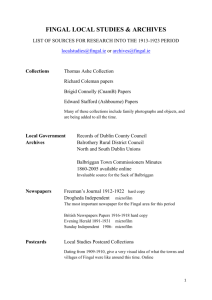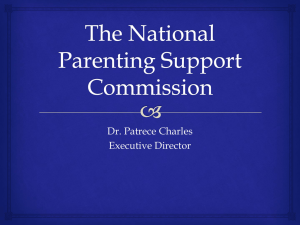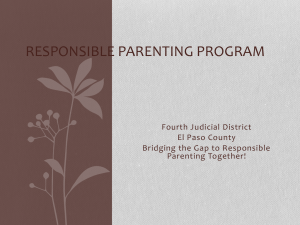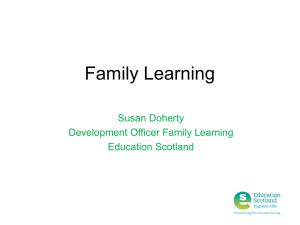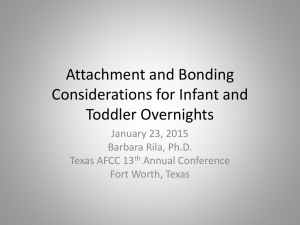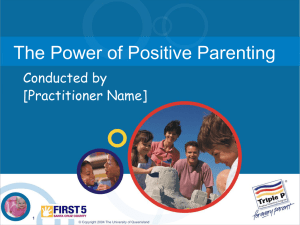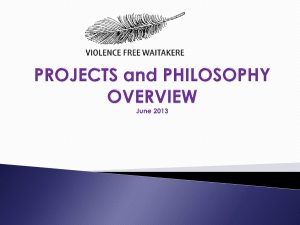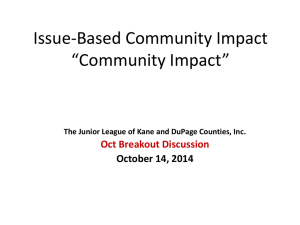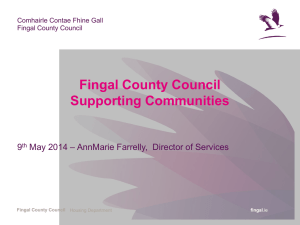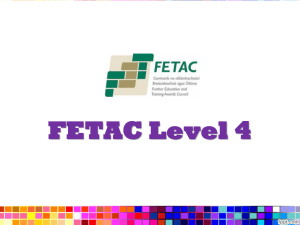Fingal Parenting Initiative - Fingal County Childcare
advertisement
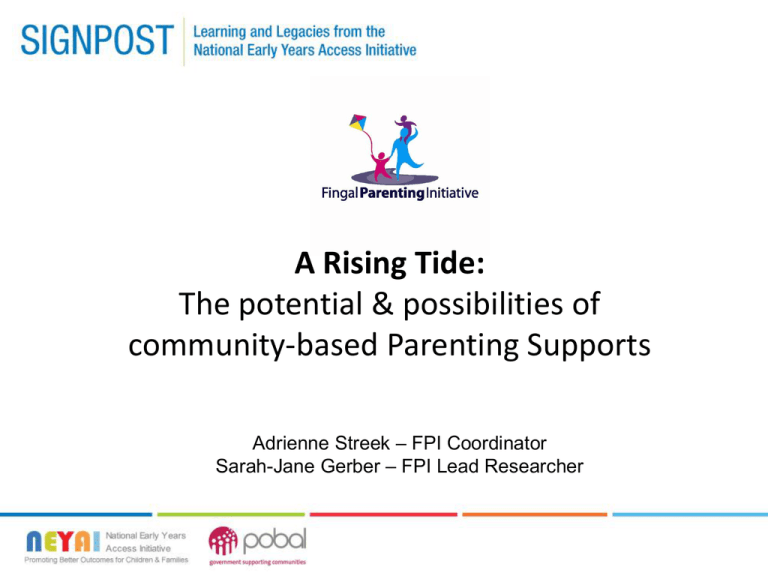
A Rising Tide: The potential & possibilities of community-based Parenting Supports Adrienne Streek – FPI Coordinator Sarah-Jane Gerber – FPI Lead Researcher Fingal Parenting Initiative The Fingal Parenting Initiative was developed in 2010 by the Fingal Children’s Services Committee in order to address local demand for parenting support. The Fingal Parenting Initiative is a collaboration within and across a range of local level organisations. These include; pre-school services, public health nurses, social work teams, family resource centres and community development projects in Fingal. The overall aim of the Fingal Parenting Initiative is to strengthen the capacity of childcare providers, increase parental wellbeing and enhance family support services in order to improve outcomes for children and families in Fingal. Fingal County Childcare Committee Barnardos Blanchardstown Area Partnership Child & Family Agency County Landscape • Fingal County covers an area of 450 square kilometres (173 square miles) • The population of Fingal as per the 2011 Census is 273,991 (over 6% of the national population) • 33 of the 42 Electoral Districts are inclined toward affluence with strong indicators of deprivation and disadvantage in Dublin 15 and Balbriggan-Urban. • Fingal is the ‘youngest’ county in Ireland Fingal Parenting Initiative Universal access to a suite of supports including: • • • • • Parent Workshops Online support and information Social networking Local links and contacts (networks and multiagency collaboration) Parent Support Programmes (7 weeks) Key Deliverables • • • • • • • • 4 established link sites/hubs 5000 + website visits since 2011 10 parent workshops (400 + parents) 80 trained facilitators delivering courses Accreditation of local facilitators 35 sites for delivery of parenting programmes 80 parenting programmes (7 week) delivered to over 800 families Direct engagement with over 1200 families in Fingal and still going…… Evidence Base • Strong evidence for effectiveness of parenting programmes • Growing evidence base that attests to the efficacy of Parents Plus Programmes • Recent study in community setting (Kilroy, Sharry, Flood & Guerin, 2010) Can Parents Plus replicate these findings in community settings with delivery by early years educators and community support services? Methodology Measures that are universal, standardised and widely used: • Strengths and Difficulties Questionnaire– measures parent perceived strengths and difficulties for the child • Parent Stress Scale – measures parental stress • Kansas Parenting Satisfaction Scale – measures parents satisfaction with their parenting skills Results • N = 286 programme completers (continued evaluation) • Guardians: 85% mothers, age range 19 – 70 years (average age 35.44) • Children: 62% boys, age range 6 months – 7 years (average age 3.59) • Significant reductions in parental stress and child difficulties & significant increases in parenting satisfaction after the 7 week programme. • Large to medium effect sizes Outcome Measures (Entire vs Clinical Sub-Sample) Measure N Parent Stress 286 Parenting Satisfaction Emotional Symptoms Conduct Problems Hyperactivity 277 Peer Problems Prosocial Behaviour Total Child Difficulties 279 279 276 280 279 279 Entire Sample Mean (SD) Pre Post 41.83 (9.15) 14.27 (3.26) 2.59 (2.12) 3.56 (2.18) 4.47 (2.50) 2.27 (1.86) 6.72 (2.14) 12.87 (5.99) 36.18 (8.46) 16.66 (2.58) 1.95 (1.91) 2.66 (1.96) 3.90 (2.43) 1.78 (1.69) 7.45 (2.07) 10.33 (5.64) t (df) 12.34 (285) -13.15 (276) 6.19 (278) 8.91 (275) 4.98 (279) 5.09 (278) -5.77 (278) 9.5 (278) Effect Size Cohen’s d .73 .81 .37 .54 .30 .31 .34 .57 Clinical Range Mean (SD) Pre Post 46.93 (8.42) 12.34 (3.01) 3.83 (2.17) 4.95 (2.16) 6.29 (2.81) 3.42 (1.81) 5.93 (2.17) 18.41 (4.96) 40.39 (9.51) 15.14 (2.72) 3.48 (2.19) 4.39 (1.89) 6.15 (2.11) 3.16 (1.78) 6.81 (1.94) 17.22 (3.78) t (df) 6.81 (84) -7.03 (82) 1.59 (83) 2.73 (82) .454 (84) 1.44 (84) -4.04 (84) 2.127 (84) Effect Size Cohen’s d .74 .77 .01 .30 .05 .15 .44 .24 Typical and Clinical/Borderline Pre- Intervention Post - Intervention Comparable Effect Size for Clinical Group Parent Reflections ‘My child stopped having tantrums, she told me today that I am a much better mummy’ ‘I have learned to stop and pause and be more tuned into my son. I feel more confident as a parent. I now enjoy my time spent with my son’ Key Learning • PPEY effective in community settings lead by community workers • PPEY effective for both clinical/borderline and typical range participants (‘Worried Well’) • Non-stigmatized, acceptable support • Increase in parental well-being and reduction in parental stress- outcomes for children • Cost effective per child compared to contemporary programmes • Cost Effective to roll out – facilitators own time • Reduced wait list time to access support • Potential reduction in need for CAHMS services Legacy? The aim of the Fingal Parenting Initiative was to: Strengthen the capacity of childcare providers Increase parental wellbeing Enhance family support services Children and families require a meaningful commitment at national level to proven supports that enhance children’s lives through mainstreaming of programmes such as the Fingal Parenting Initiative.
